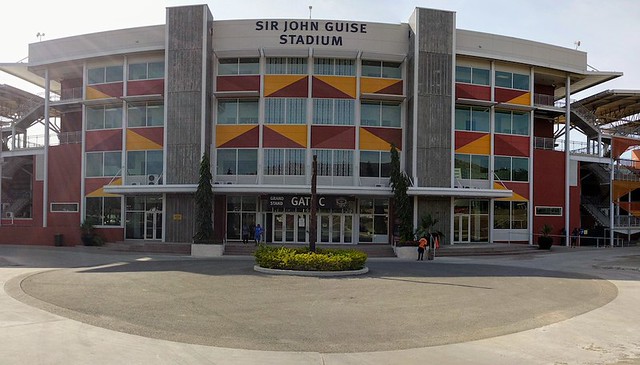Port Moresby, Papua New Guinea—The Sir John Guise Stadium was the venue for the Oceania Leadership Conference conducted in Papua New Guinea on the weekend of July 7 to 8, 2018. Oceania Regional Director Dr. Shang Seon Park gave inspirational guidance and leadership for the event. Dr Robert Kittel was the keynote presenter of UPF’s Principles of Peace over the two days. The audience of around 80 participants included many teachers, some Christian ministers, university students and community leaders.
The program was conducted over two days and had the theme “Providing Vision and Leadership for Nation-Building and Peace.” It included the principles of creation, the human Fall, and three lectures on God’s work through history. The participants were very receptive and keen to study more. There were many current teachers present, and many requested the content to be included in the school curriculum. The human Fall lecture was particularly impactful. In Papua New Guinea there is a tendency for polygamous relationships, especially in remote communities, and AIDS is a serious problem. The HIV problem has been described by the Joint United Nations Program on HIV/AIDS (UNAIDS) as a "concentrated" epidemic, with certain key population groups and geographical locations affected disproportionately.
The constitution of Papua New Guinea specifically says that it is founded on “Christian principles.” In the presentations, we focused on highlighting the Christian principles of purity before marriage and fidelity between husband and wife after marriage. This was a very promising approach as it was very well received. The message of family and family values also resonated with the participants because the traditional tribal culture is strong and is basically an extended family system.
In conclusion, we were impressed by the openness and receptivity of the people for UPF’s Principles of Peace and believe that a strong focus on education will produce substantial results.
Additional Background About Papua New Guinea:
Papua New Guinea is an island nation in Melanesia with a population of 8 million. 96% of the population identify as Christian. The capital, Port Moresby, has a population of 284,000.
New Guinea is one of the largest islands in the world. Lying just south of the equator, 160km north of Australia, Papua New Guinea has more than 600 islands and 800 indigenous languages. Papua New Guinea occupies the eastern half of the rugged tropical island of New Guinea (which it shares with the Indonesian territory of Irian Jaya) as well as numerous smaller islands and atolls in the Pacific.
The central part of the island rises into a wide ridge of mountains known as the Highlands, a territory that is so densely forested and topographically forbidding that the island’s local peoples remained isolated from each other for millennia. Some of the many islands constituting PNG are volcanic, with dramatic mountain ranges, and all are relatively undeveloped.
Many species of birds and mammals found on New Guinea have close genetic links with corresponding species found in Australia. One notable feature in common for the two landmasses is the existence of several species of marsupial mammals, including some kangaroos and possums, which are not found elsewhere.

